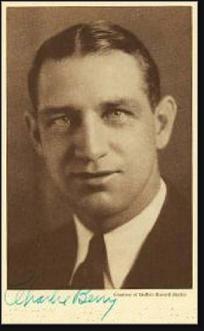
Charlie Berry
Sports: Football & Baseball
Born: October 18, 1902
Died: September 6, 1972
Town: Phillipsburg
Charles Francis Berry Jr. was born in Phillipsburg on October 18, 1902. Charlie came from a sports family. His father, Charlie Sr., was a professional baseball player from Elizabeth. When Charlie was a boy, his father worked for Ingersoll Rand, a rock- drilling company. Charlie was a good baseball player, but his best sport was football. He was a legendary star in the rivalry between Phillipsburg High and Easton, across the river in Pennsylvania.
After graduating from Phillipsburg, Charlie attended Lafayette University, where he played both sports. He was a member of Walter Camp’s 1924 All-America team. Charlie distinguished himself as one of college football’s great early pass-catchers. He played defensive end, too.
Charlie signed a baseball contract with the Philadelphia A’s after graduation and got into 10 games with the team during the summer of 1925. That fall, he decided to try his hand at pro football. He joined the Pottsville Maroons in 1925 and teamed with passer Jack Ernst to give the Maroons a dangerous aerial attack. Charlie caught 31 passes for 349 yards and 4 touchdowns. He also kicked field goals and extra points for the team, and ended up leading the NFL with 74 points. Pottsville finished with the best record in the NFL at 10–2, but were disqualified for championship consideration because the Maroons had played an exhibition game against a group of Notre Dame All-Stars (including the vaunted Four Horsemen) in Philadelphia, which violated the territorial rights of the Frankford Yellow Jackets. The irony was that the Maroons won the game, changing public opinion about the quality of pro vs. college football. And Charlie had booted the winning field goal.
Charlie led Pottsville to another 10-win season in 1926. He was voted All-NFL in each of his two seasons.
After two years toiling in baseball's minor leagues, Charlie found his way back to the majors in 1928 with the Boston Red Sox. Over the next four years he served as Boston’s primary catcher. Charlie was a decent hitter, but his best asset was his ability to throw out would-be base stealers. Charlie was traded to the White Sox early in the 1932 and batted a career-high .305. He returned to the A’s and retired to coach under Connie Mack. During the off-season, Charlie coached football at Grove City College.
During World War II, Charlie became an umpire. He was an American League ump from 1942 to 1962, and called five World Series and five All-Star Games. He became an supervisor after that, and actually returned to the field during the 1970 playoffs during a labor dispute between the AL and the umpires. Charlie also served as a linesman in the NFL, and officiated the famous 1958 “Sudden Death” championship game between the Colts and Giants.
In the summer of 1972, Charlie suffered a stroke, and died of a heart attack later that year at the age of 69. He was inducted into the College Football Hall of Fame in 1980.
|